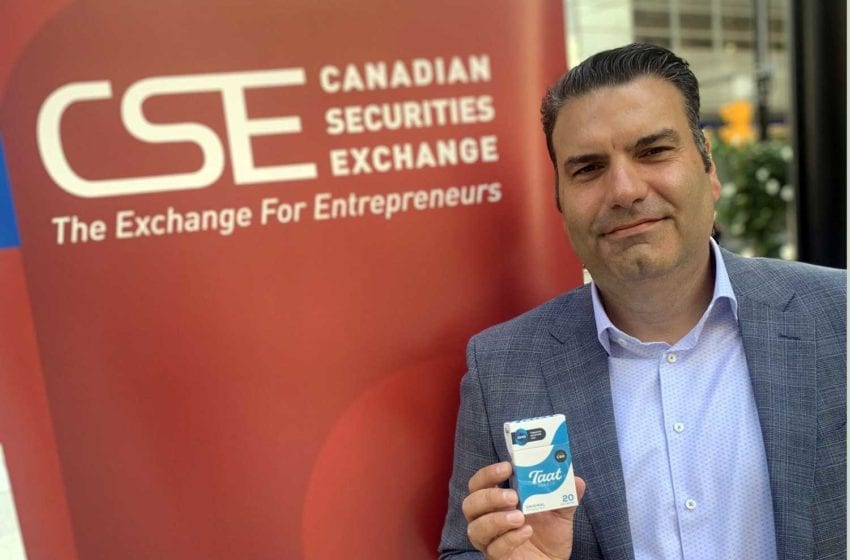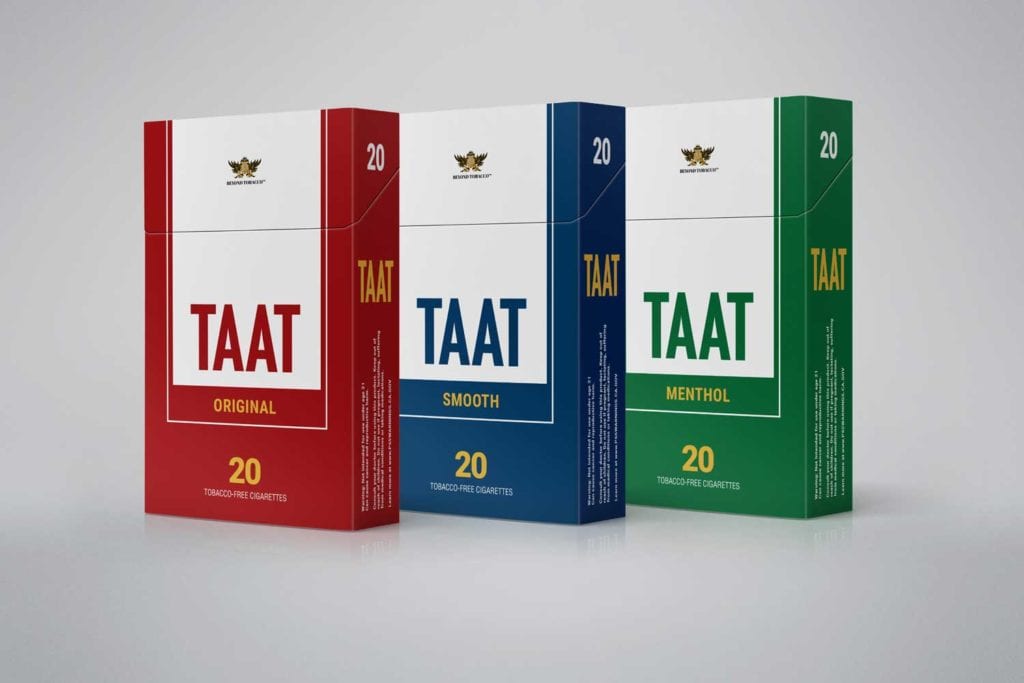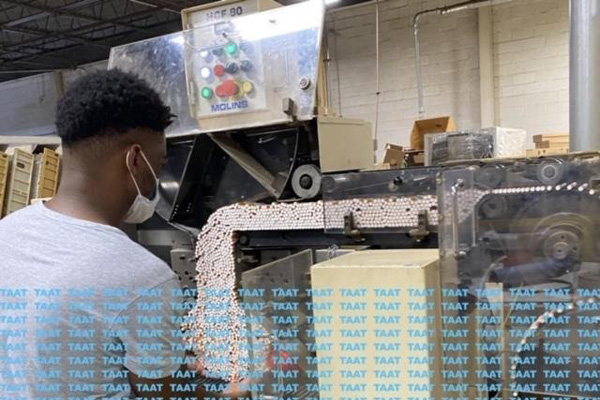More than a Cigarette
- Also in TR Cannabis Print Edition
- January 1, 2021
- 0
- 0
- 8 minutes read

Setti Coscarella

(Photos courtesy of Taat Lifestyle and Wellness)
Taat products offer smokers their familiar ritual without the disadvantages of nicotine and tobacco.
By Marissa Dean
In recent years, we’ve seen the tobacco and vapor industry change dramatically—focus has been shifted to less-risky products, including heat-not-burn and low-nicotine products. Now, enter hemp.
In 2018, U.S. Congress passed the Farm Bill, legalizing hemp with less than 0.3 percent THC, the psychoactive component in cannabis, in all 50 states. Since then, some tobacco farmers have either shifted to growing hemp or added it to their repertoire as an additional income source. In the November 2020 election, some states voted on cannabis legislation, deciding whether to legalize medical and/or recreational cannabis.
This poses the question of how the hemp and cannabis industry may interact with or change the tobacco and vapor industry. Some major tobacco companies have taken a stake in the hemp industry as it has grown while others are hesitant to go that route due to regulations and legality questions across states. Taat Lifestyle & Wellness seems to be bridging the gap between the two industries—its products will offer smokers a direct, comparable alternative to traditional combustible tobacco cigarettes.
Taat Lifestyle & Wellness is a publicly traded company based in Vancouver, British Columbia, Canada. According to its website, it is an early stage life sciences company. The firm says it aims to provide smokers with a better overall experience than smoking traditional cigarettes. Taat CEO Setti Coscarella notes that Taat is not your traditional cigarette. In fact, he classifies it as a completely new product.
“Nicotine is a problem,” said Coscarella, who was previously a lead strategist at Philip Morris International where he worked on the IQOS heated-tobacco product and studied smokers. “None of the tobacco companies or vape companies can wrap their mind around selling something that isn’t addictive. … [O]ur product is nonaddictive. So it has hemp, yes; it has CBD, but I’m not positioning it as a hemp cigarette with CBD because it doesn’t have the same experience as a hemp cigarette.”
Taat has created this new product using its proprietary Beyond Tobacco filler, a hemp-based filler that is processed to smell, taste and look like traditional tobacco but without the nicotine. “Nicotine as a drug is a very useless drug,” Coscarella said. “It does nothing other than keep you addicted to doing the thing that you need in order to consume that drug.”
The company’s goal with Taat cigarettes is to offer users another alternative to traditional tobacco products that will not become addictive. “I want to give smokers the freedom to choose; if they want to smoke, they can smoke; if they don’t, then they don’t have to. I think that is a very important freedom we want to give back to smokers. That’s ultimately why we exist.”

Coscarella hopes Taat’s new products will allow smokers to make a choice—continue smoking traditional cigarettes or using vapor products, all with some level of nicotine in them, or switch to Taat, which offers the ritual of traditional cigarettes but does not contain any addictive drugs. Coscarella believes that choice is important. “I don’t think nicotine is the main reason people smoke; if it were, then for everybody who wants to quit, the [nicotine] patch would work. … If it were, then the vapes and the heat-not-burn products would have a higher long-term efficacy rate with actual smokers because I’m just giving you nicotine. But they don’t. [Smokers] go back [to smoking traditional combustible cigarettes] because there’s a certain ritualistic component on the other side that none of these other things have. I think it’s important to try to match that ritual where I think the low-nicotine products obviously would have something from that standpoint, but you still have a physiological piece that needs to counterbalance somehow.”
Low-nicotine products are attempting to “fix” the smoking problem—the idea behind these products is that smokers can switch to low-nicotine cigarettes and then eventually stop smoking. However, Coscarella does not think they will work very well. “You haven’t replaced it [nicotine] with anything. You’re just giving your consumers less of something.” Taat, however, aims to avoid that issue by replacing the nicotine with CBD in the products. Many people erroneously think that cigarettes calm them down, according to Coscarella, when in reality they feel calm after smoking only because they were experiencing nicotine withdrawal. Smoking provides the nicotine your body was craving. Taat products can give consumers that calming feeling to counteract the feeling generated from nicotine withdrawal, thanks to the CBD in the Beyond Tobacco filler.

Taat products will soon be on the market; on Dec. 11, products will be shipping to Ohio distributors for sale. Each pack will retail for $3.99—allowing users of any cigarette brand to afford Taat—and will be available for purchase by those aged 21 or older. Taat will have online age verification for purchases through its website and much like tobacco, will work with retailers to ensure their customers are of legal age as well. “We’ll have a self-declaration online, so someone should be over the age of 21. And then from a retailer standpoint, they should endeavor to police this as they do any combustible cigarette product that they would otherwise sell,” said Coscarella.
Currently, hemp is not regulated in the same ways that tobacco and vapor products are. Outside of the Farm Bill, regulations vary from state to state, and hemp products are not under the oversight of the U.S. Food and Drug Administration (FDA) or subject to anti-smoking bills or certain federal, state or municipal excise taxes. “That being said,” said Coscarella, “it’s imperative that we’re able to communicate what the value of this product is from a societal standpoint,” in much the same way that the premarket tobacco product application (PMTA) process aims to do with tobacco products.
Coscarella believes the FDA will eventually get involved with hemp. “If cannabis were to be legalized—depending on how the election pans out—it’s likely that it will require regulation, and if that happens, I don’t think they’ll carve out hemp. No different than how it was done in Canada. When they passed the Cannabis Act—the Cannabis Act encompasses both cannabis and hemp.” So while Taat isn’t currently faced with major restrictions, that could change.
Much like the rest of the world, the Covid-19 pandemic has affected the launch and marketing of Taat. While in-person events would help with building the buzz, Coscarella said, the company’s marketing plan will be heavily online-based. “I think you get a better return on investment from a digital ad that can be served to somebody when they’re in the time to see it.”
Taat cigarettes will be an interesting addition to the ever-changing smoking industry. As the company prepares to roll out this initial product, Coscarella is already looking ahead. “I think there are other areas within the tobacco space that would be interesting for us to look at, whether it be through different delivery mechanisms or different formats. … But initially, I think the exercise is to go after the biggest category and build a family of brands that can help capture some of those ancillary areas.”

